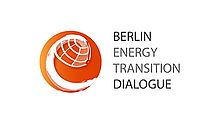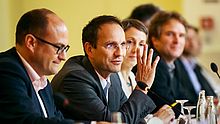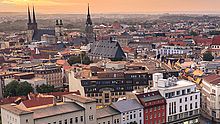In 2011, Germany decided to withdraw from nuclear power. The final nuclear power station is scheduled for decommissioning no later than 2022. This fundamental transition in energy supply will also necessitate further developments in the current system of storing and distributing electricity. The transformation process can succeed on a technical and social level by integrating a variety of concepts.
Smart grids: New grids for new energy
Electricity highways are among the most vigorously debated projects within the energy transition. They are modern grids that transport wind energy from Germany’s north and east to the south and west.
In future, public grids will have to be prepared for the fluctuation in electricity generation using renewable energies. Many smaller power generation units are already connected to the grid, among them photovoltaic systems mounted on the roofs of houses. They are decentralised systems that feed electricity into the grid. So-called ‘smart grids’ will be needed in order to manage this ‘oncoming traffic’ in the electricity grids. The term describes intelligent grids that use a variety of measures to ensure efficient interaction in production, storage, grid management and consumption. New instrumentation and control technology will have to be fitted to the conventional grid.
Smart markets: Consumers as producers
The demand for new technical systems extends beyond the grids themselves. Consumers play an important role in this respect, as they will increasingly become electricity producers and in doing so will precipitate a greater demand for needs and consumption-based integration of generation and demand. The term ‘smart markets’ describes the various activities involved in this process.
Digitalisation will enable this integration of generation and demand. This can involve installing intelligent measurement systems (smart meters) to replace current electricity meters installed in homes. Not only are these systems designed to measure electricity consumption or the amount of electricity fed into the grid in real time, they can also transmit important information on grid status and other factors to the system operator.
Energy storage systems: For when the sun doesn’t shine
Merely transporting and distributing the electricity produced using renewable energies will not be a panacea. The sun does not always shine, and the wind is not constant. Storing the energy is therefore among the most significant challenges within the energy transition. Hence, the federal government will make up to 200 million euros available in the next few years to conduct research into specific storage technology.
A ground-breaking approach is to link sectors based on so-called power-to-gas technology. This is a chemical procedure that splits water to produce hydrogen, which can then be stored or used as a fuel. The hydrogen can also be converted into methane by adding carbon dioxide, for instance from a biogas system. The methane can then be fed directly into the natural gas network.
Sectoral linkage concepts of this kind produce synergy and contribute to decarbonisation through green electricity. Flexible conventional power plants that guarantee a secure electricity supply are needed to ensure security of supply when renewable energy can only generate lower volumes.
The energy transition as a social issue
Social aspects are of vital importance during the transformation of current practices into a new energy system. After all, the success of the energy transition is decided as much by the construction of new electricity lines, gas power stations, electricity storage units and off-shore wind farms as it is in cellar boiler rooms, electronics shops and car dealerships. This requires a thorough exchange of information, reliable consultancy and honest discussions.
What is needed is a forward-looking strategy that optimises the technical and commercial aspects of the defined objectives and that creates a fair balance of interests under consideration of the general social framework. dena provides concepts, information and network processes to accompany the energy transition in Germany. Together with partners in politics, administration and the economy, it develops solutions and strategies for forward-looking, intelligent energy systems that guarantee a sustainable and secure energy supply. Here, dena mediates the multi-stakeholder processes, advises on policies and strategies and prepares surveys and studies on the energy industry. It is also involved in the implementation of dialogue platforms and the organisation of nationwide campaigns to provide stakeholders and the general public with targeted information.











